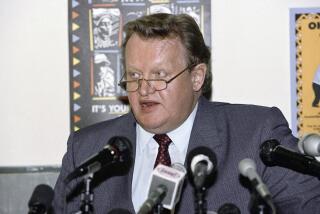Waldheim Will Not Be Seen at Conference
- Share via
VIENNA — Austrian President Kurt Waldheim will be absent this week from all official and social functions for the opening of the third Helsinki review conference--the largest gathering of foreign ministers in the Austrian capital since the famous Congress of Vienna in 1815.
Under continuing attack for his World War II service in the German army, which allegedly included involvement in war crimes, Waldheim is also refusing all requests for interviews or even photo sessions in his presidential office in the Hofburg palace, where the Helsinki review conference is taking place.
During the preparatory stage for the Helsinki conference which was held here in September, word was passed by various delegations to their Austrian hosts that Waldheim’s presence at any conference function might cause embarrassment.
Put more bluntly, a number of foreign ministers would have boycotted any meetings at which Waldheim presided or took part, and others would have walked out.
Waldheim, a conservative, was elected to the largely ceremonial post of president in May, but the Austrian government is socialist.
The government quickly found a convenient precedent for excluding the country’s president from having anything to do with the proceedings. At the last Helsinki review conference in Madrid in 1980, it was Spain’s prime minister, and not the head of state, King Juan Carlos I, who made the official speech of welcome to the other delegation heads. The king, however, did then make a formal visit to the Helsinki conference and delivered a speech at a later stage in its three-year run in Madrid.
At today’s opening session of the foreign ministers from the 35 states that signed the Helsinki accords in 1975, Austrian Foreign Minister Peter Jankowitsch will preside as chairman of the meeting, and Austrian Chancellor Franz Vranitzky will deliver the opening address of welcome.
Waldheim will neither be seen nor heard. Whatever the protocol precedents that justify his exclusion, this is a major diplomatic snub by virtually all of Europe. It appears to condemn the former U.N. secretary general to a six-year presidential term in which he will rarely be invited to make state visits outside the Austria, and heads of state will rarely come to shake his hand in Vienna.
More to Read
Sign up for Essential California
The most important California stories and recommendations in your inbox every morning.
You may occasionally receive promotional content from the Los Angeles Times.










